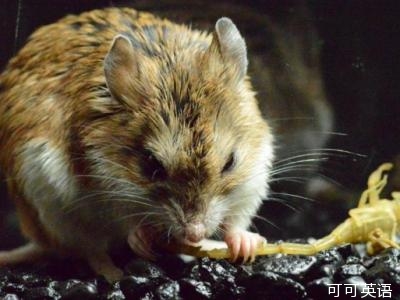(单词翻译:单击)
Rodents called grasshopper mice have an unusual favorite food.
这种被称为食蝗鼠的啮齿动物最喜欢的食物有些不同寻常。
Not grasshoppers. No, they really like scorpions.
可不是蚱蜢。它们真的喜欢的是蝎子。
You can see the problem.
你肯定发现问题所在了。
But the mice shrug off any scorpion stings.
但是老鼠却免受蝎子蜇伤的危险。
And a new study shows how.
一项新的研究为你揭晓答案。
Researchers injected common house mice with scorpion venom.
研究人员将蝎子毒液注入进常见的家鼠体内。
The mice nursed the injection site for several minutes.
家鼠好需要照料注射部位几分钟。

But grasshopper mice injected with venom fussed for only a few seconds.
但注射毒液的食蝗鼠却只有有几秒钟的小骚乱。
In fact,they were more bothered by saline solution.
事实上这些小家伙对盐溶液更为感到不安。
So what's going on?
那么奥秘究竟在那里?
In the house mouse, a specific type of nerve-cell signaling-channel got activated by the venom.
在家鼠体内,一种特定类型的神经细胞信号通道被毒液激活。
But this same channel in grasshopper mice stayed inactive in the presence of venom—meaning the mice remained blissfully ignorant.
但同样的通道在食蝗鼠体内毒液刺激下则并不活跃,这就意味着食蝗鼠依然幸福的不疼不痒。
In addition, a separate pathway did react to the scorpion venom—and it actually temporarily blocked pain signals.
此外,一种单独的通道也对蝎子毒液起了反应,实际上是暂时阻止疼痛信号。
Meaning that for grasshopper mice, scorpion venom is actually an analgesic.
这对于食蝗鼠而言,蝎毒实际上是一种止痛剂。
The work is in the journal Science.
该研究已经在《科学》杂志上发表。
Understanding details of this system could lead to new approaches in the treatment of pain in people,
深入研究这一机制的细节可能会开拓出治疗人们对于疼痛的新方法,
so that someday we might ask, Scorpion, where is thy sting?
或许有一天我们可能会问,蝎子的毒钩在哪里?


